A bold blueprint for Oman reforms
Joseph A. Kechichian writes: Qaboos empowers politicians, insists on accountability and encourages freedom of assembly and speech

Sultan Qaboos Bin Saeed seldom stops surprising as befits an original revolutionary who ushered in his share of fundamental changes during the past four decades. In less than two weeks, however, the Omani ruler surprised anew as he issued no fewer that 28 royal decrees, which literally shocked a vast majority of his subjects.
Observers unaccustomed to tectonic shifts marvelled at the speed of these changes and, more important, at their substantive features. The most recent, which empowered the sultanate's two advisory councils — the elected Majlis Al Shura and the appointed Majlis Al Dawla — with legislative authority, is historic. What will Oman look like after these latest reforms?
A few days after demonstrations in Sohar surprised everyone, Sultan Qaboos made modest changes, replacing several ministers and undersecretaries, advisers, and Majlis Al Dawla members. Against a wave of protests, and instead of delaying, he dismissed key aides, espoused freedom of speech by tolerating dissent, supported calls for accountability, and agreed to share power.
The sum total of these incredible transformations shook the political establishment even if they reaffirmed the ruler's bold outlook.
Still, what surprised most was Muscat's unabashed honesty in tackling what many assumed would never change. The first wave of seven decrees was proclaimed on February 28, addressing various concerns of the business community along with a Supreme Court and an ambassadorial appointment.
On March 1, two decrees set up a Consumer Protection Authority as well as an administratively and financially autonomous Public Prosecution Department.
Two days later, Sultan Qaboos amended the State Audit Institution and expanded its prerogatives and on March 6, named replacements for his long-time ministers of the diwan, royal office, as well as secretary-general of the royal court.
His most dramatic announcements came on March 7, in what one observer referred to as ‘the night of the long Khanjars', when eight royal decrees restructured the Council of Ministers, appointed a new secretary-general for the Council of Ministers, selected a chairman for the State Audit and Administrative Institution, chose a chairman of the Tender Board, designated an adviser at the Diwan of Royal Court, picked an adviser for the Finance Ministry, assigned two new undersecretaries for the Ministry of Agriculture and Fisheries respectively and, lo and behold, cancelled outright the Ministry of National Economy.
On Sunday, Sultan Qaboos granted legislative and audit powers to the two chambers that make up the Majlis Oman, and promoted a respected military officer as the new inspector general of police and customs.
Acting fast literally meant that the Sultan listened, adapted, and applied many of the demands that were deemed to be in the country's best interests. Yet, the Sultan's sweeping shake-ups, which ushered in many new faces in the government along with pay rises as well as promises to help create over 50,000 new civil service posts, failed to satisfy protesters.
Young men and women pondered whether the potential appointments would be coveted managerial positions or whether their dreams will only be fulfilled once they learn to patiently work within established systems.
Oman, along with Bahrain, will now benefit from a generous $1 billion (Dh3.67 billion) annual stipend until 2021 from the Gulf Cooperation Council to invest in socio-economic programmes. Of course, a commitment of this type will go a long way in meeting immediate needs to create job opportunities even if Sultan Qaboos, as well as Omanis, know that they must create sustainable long-term employment to satisfy increasingly educated young men and women.
Therefore, while Muscat will certainly be able to fulfil recent boosts to state pensions as well as accelerated payments to families receiving state social security over the short-term, neither Oman nor any of the other Arab states experiencing similar challenges can buy themselves out of basic reforms. In the long run, Omanis must be willing to dirty their hands, and invest blood and sweat in building their nation.
Among the many demands made by educated young Omanis camping in the parking lot of the Majlis Al Shura in Seeb — transformed for the occasion into Sahat Al Sha'ab [the People's Square]—were calls to give the elected body real governance powers. The genuinely liked ruler responded with the kind of rejoinder that rose to the occasion, providing his nation with new opportunities, and averting confrontations.
Indeed, Muscat understood far better than most other Arab capitals facing popular uprisings that any responses ought to be meaningful, rather than simply reflect a scramble to appease demonstrators. When police forces confronted protesters in Sohar, with the unfortunate violence that ensued, Sultan Qaboos was furious that his troops were obligated to open fire.
According to a high-ranking security official in Muscat, and although protesters clearly broke the law by destroying public property, the Omani monarch immediately ordered police to back down, judging that a military clash would be counter-productive. He carefully assessed demands made by a crowd largely composed of young unemployed men, and concluded that it was his duty to rush to their assistance, instead of chastising them for their audacity.
Sultan Qaboos' revolutionary instincts served him and Oman well as he positioned the Sultanate on the path of a new chapter, empowering politicians, insisting on accountability, and encouraging freedom of assembly and speech.
Welcome to Oman 2.0.
Dr Joseph A. Kechichian is a commentator and author of several books on Gulf affairs.



